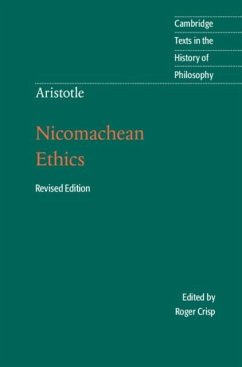This new edition of Aristotle's Nicomachean Ethics is an accurate, readable and accessible translation of one of the world's greatest ethical works. Based on lectures Aristotle gave in Athens in the fourth century BCE, Nicomachean Ethics is one of the most significant works in moral philosophy, and has profoundly influenced the whole course of subsequent philosophical endeavour. It offers seminal, practically oriented discussions of many central ethical issues, including the role of luck in human well-being, moral education, responsibility, courage, justice, moral weakness, friendship and pleasure, with an emphasis on the exercise of virtue as the key to human happiness. This second edition offers an updated editor's introduction and suggestions for further reading, and incorporates the line numbers as well as the page numbers of the Greek text. With its emphasis on accuracy and readability, it will enable readers without Greek to come as close as possible to Aristotle's work.
Dieser Download kann aus rechtlichen Gründen nur mit Rechnungsadresse in A, B, BG, CY, CZ, D, DK, EW, E, FIN, F, GR, HR, H, IRL, I, LT, L, LR, M, NL, PL, P, R, S, SLO, SK ausgeliefert werden.


